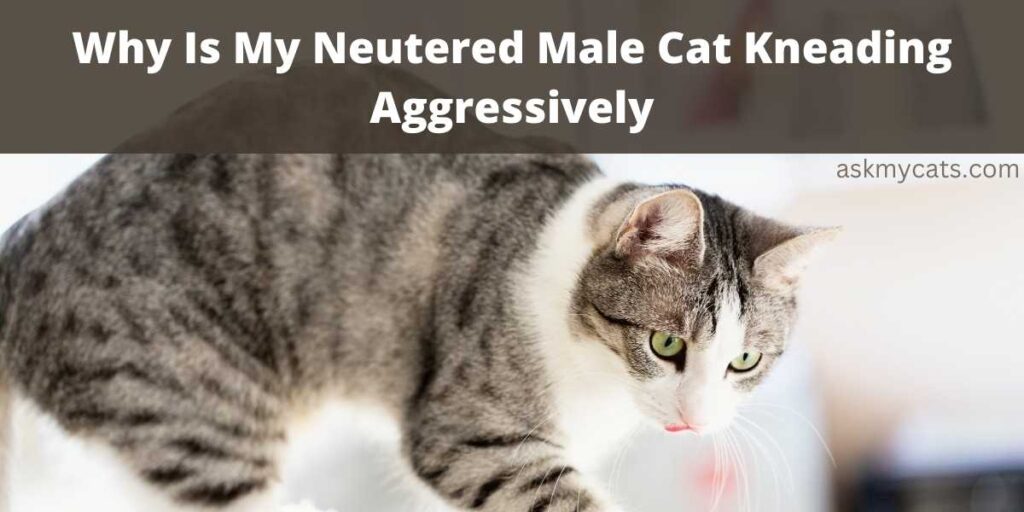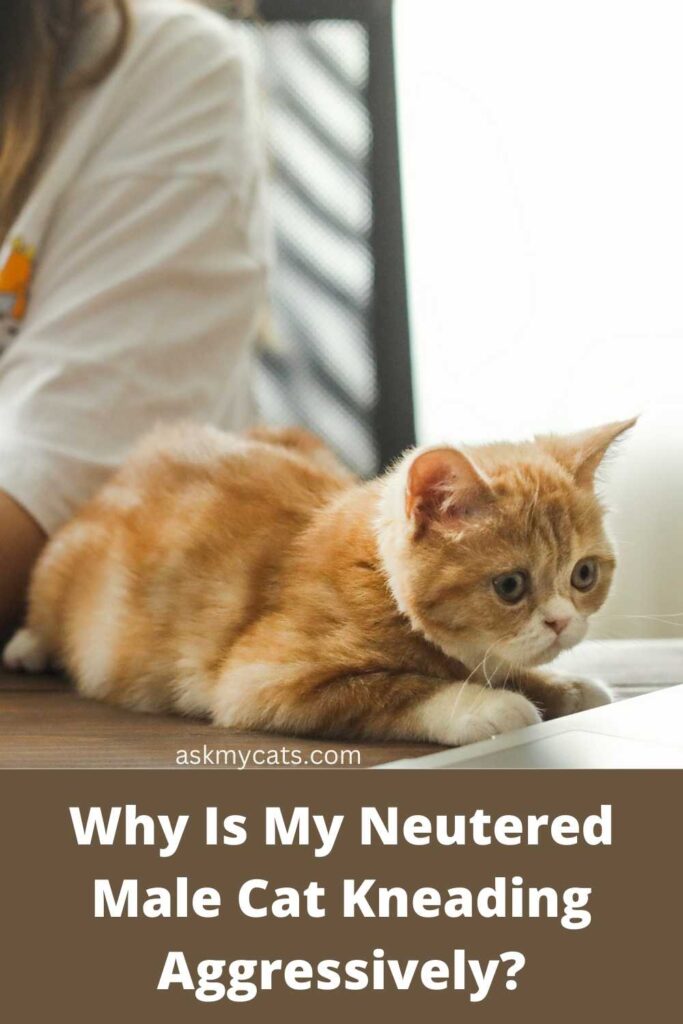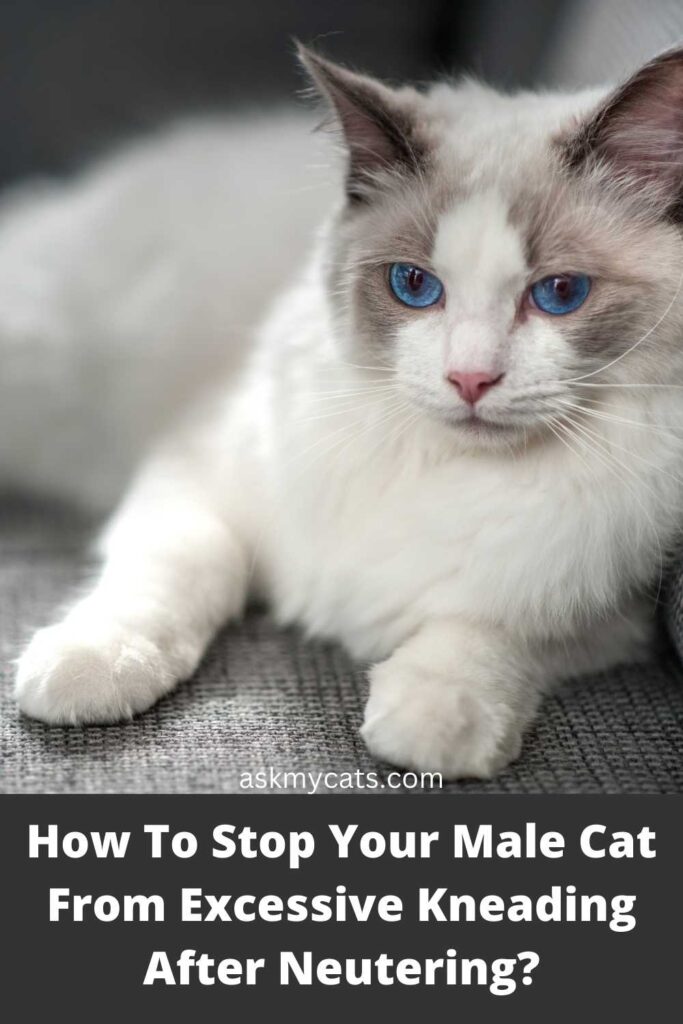Congratulations on getting your cat neutered! You have just saved yourself and your cat from having to parent an unwanted litter of kittens.
You might probably notice some subtle changes in your cat once he is operated on, and although they might look concerning, most of them aren’t. Your furbaby is trying to adjust to the new alteration, so all you need to do is stay patient and let your body do its thing.
I am sure that you wouldn’t want things to escalate until it becomes extremely bothersome and if it does, a vet visit is always the first option.
In this article, we’ll talk about whether it’s normal for cats to knead more after the procedure and how to stop a cat from kneading excessively.
Let’s dive into it to know about why neutered male cats knead aggressively.


Give Your Cat the Perfect Day
Get the Free Ebook!
Is It Normal For A Neutered Cat To Knead More?

Yes, it is completely normal for an operated male cat to knead more than usual. The scent glands on the paws of male cats release the kitty scent through kneading.
Although kneading is a typical cat activity, it can become excessive. It’s likely a problem that doesn’t even call for significant behavioral change.
For a variety of reasons, you may be confused about your neutered cat’s aggressive kneading.
What Is Kneading Supposed To Be Like?
Regardless of their size or shape, cats of all breeds like kneading. It involves switching between using the left and right paws to press into something with the front paws, such as a blanket or even your lap.
While kneading, some cats may purr, while some might knead a little bit with their back paws as well. While some stretch their claws and can scratch, others lovingly knead.
Male and female cats both exhibit kneading activity. Cats that are young and old may knead. Even enormous cats that live in the wild, such as lions or tigers, have been observed kneading.
It’s crucial to figure out what made him so hostile. You want to know if a trip to the vet is necessary. When you’re not at home, this vigorous kneading may occur frequently. Most likely, it is a form of boredom.
Give your cat mentally interesting toys, or consider leaving a soft radio on.
What Is Aggressive Kneading?
Particularly when cats start kneading the owner’s body, cat kneading behavior can occasionally turn out to be too violent for owners to handle. This is when it identifies as aggressive behavior.
Since male cats typically dig their claws into their prey during mating, male cats are more likely to engage in violent kneading behavior.
Neutering your cat will help you deal with the male cat’s aggressive kneading behavior. The cat’s kneading habit frequently drastically decreases after neutering.
Set aside specific hours each day to play with your cat and his favorite toys. Since you don’t want your male cat to act aggressively toward people, always arrange play around a toy.
You’re attempting to instruct him to avoid acting violently toward people and to channel his rage via constructive means.
Pet your cat in a unique way. When they start to feel incredibly at ease and relaxed, cats knead more.
Not that you shouldn’t try to soothe your cat, but if their kneading actions start to get too violent, switch from long, leisurely strokes to short, quick strokes. He will lose his laid-back attitude as a result, and he might start to feel like playing.
Interesting Read: Pregnant Cat Kneading: Reasons & Solutions
Why Is My Neutered Male Cat Kneading Aggressively?

Kneading by cats is typical behavior. Your cat will start to knead the area with his paws in a slow, rhythmic motion whenever he finds a place he wants to make himself comfortable, whether it be a sofa cushion or your lap.
The toes on your cat’s front feet will also stretch and close regularly. Your cat’s kneading action could be accompanied by a gentle purr.
Because they recall feeling these emotions as a result of the kneading behavior they engaged in as kittens, adult neutered cats engage in kneading behavior when they are feeling emotions of happiness, emotional security, and contentment.
In general, stressed-out and unhappy cats don’t engage in kneading behavior. Kneading behavior is frequently displayed by adult cats as a sign of affection for their human owners.
1. Hormones
Just before they go into heat, male cats could engage in kneading behavior. Just before and throughout their heat cycle, they become amiable and affectionate, and they may show their owners more affection than usual.
The hormones left over in their testicles cause the heat cycle to continue after the operation. If you neuter your cat, he should stop kneading in response to the heat as well.
Additionally, cats may knead as a manner of leaving territorial markings. Cats have pheromone scent glands in the pads of their paws, and when a cat wants to establish its territory, kneading activity can help release this aroma.
Before spraying urine to indicate their territory, cats may often knead the ground with their paws.
2. No Distractions
Set aside specific hours each day to play with your cat and his favorite toys. Since you don’t want your male cat to act aggressively toward people, always arrange play around a toy.
You’re attempting to instruct him to avoid acting violently toward people and to channel his rage via constructive means.
Pet your cat in a unique way. When they start to feel incredibly at ease and relaxed, cats knead more.
Not that you shouldn’t try to soothe your cat, but if their kneading actions start to get too violent, switch from long, leisurely strokes to short, quick strokes.
He will lose his laid-back attitude as a result, and he might start to feel like playing.
3. Sexually Frustrated
Many people think that neutering a male cat will make him mellow and laid-back. They believe that removing his testes will reduce his sex desires and spraying tendencies.
Cats are naturally territorial, and after neutering, this territorial tendency can become hostile. This behavior doesn’t always end with neutering.
If your male cat has his claws clipped, he may still be hostile if he feels that something or someone belongs to him.
The kneading behavior isn’t usually altered by neutering. After neutering, some sex-related behaviors can still exist. The next step is to get acclimated to simultaneously kneading and humming.
Interesting Read: Why Do Cats Lick And Knead You?
How To Stop Your Male Cat From Excessive Kneading After Neutering?

Although it is not possible for you to completely stop your cat’s aggressive kneading behavior, you can try these methods to bring it under control:
1. Medications
Speak to your veterinarian if you think that his kneading occurs a little bit too frequently. It is possible to treat a sexually aggressive cat with medicine.
The veterinarian will also make sure that the neutering procedure your cat underwent was done correctly. One testicle being removed by a veterinarian is not new.
2. Acceptance
Cats also knead before going to sleep, much like a dog would. He wants to get his bedroom ready for a good night’s sleep.
It’s possible that this kneading dates back to the time when wild cats would pat a bed area or nest into place.
This was used for both sleeping and giving birth. This “kneading a bed into place” behavior has persisted throughout the ages. A cat’s natural instinct is to do this before taking a catnap.
3. Distraction
By diverting his interest with a pleasant treat or perhaps some cat toys, you can try to stop him from kneading. Even today, some individuals utilize pheromone-based sprays to entice their pets to new locations.
Frequently Asked Questions
Why does my cat knead by rubbing his front and back paws together?
Cats love to stretch out all the knots after naps and are natural yoga masters. Just think of how relaxing it is to hold onto something and pull against it when your shoulders are sore. One of the various ways cats keep themselves limber between naps is by kneading their paws.
These are some of the more prevalent hypotheses on why cats are believed to knead, but they by no means cover all the possibilities.
Kneading is a typical, instinctive, and natural cat action, whether your cat is doing it to express affection for you or to claim you as their own.
Why is my cat shaking and kneading me?
If your cat is kneading you, she probably does it because she trusts you. She is now treating you, her new “pet parent,” in the same way she did when she was a kitten and massaging her mother.
She might knead you gently to indicate how secure and protected she feels around you. The same explanation explains why your cat may purr when you cuddle up to her.
Final Words
You don’t want to simply ignore the aggressive kneading of your neutered cat. Keep an eye out for any sudden, unexplained increases in his kneading or pounding.
A trip to the vet can ease your worries if it turns out that he is ill. Make sure you’ve done everything you can to divert his attention from his conduct before you go to the veterinarian.
Pay close attention to him, monitor his diet, and clip his claws. Create a vibrant, alluring setting for him. A contented, at ease cat has much less motive to knead than a stressed, dissatisfied, or bored cat.
Let us know in the comments section if your cat showcased such behavior after he was neutered. What did you do to get his actions under control?
Interesting Read: Cat Humping While Kneading (Reason And Solution)
